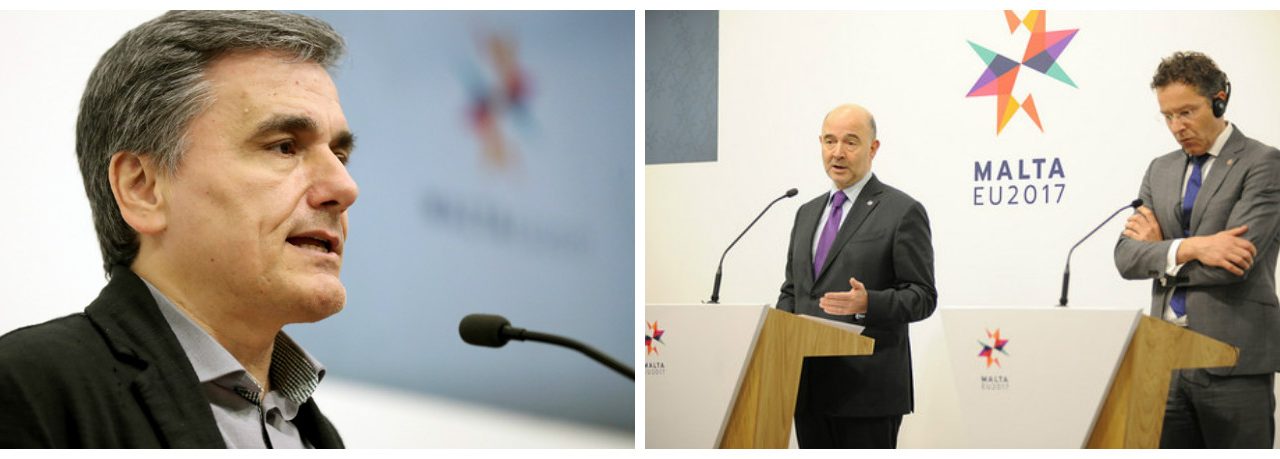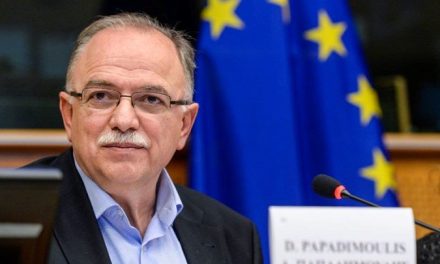The institutions and the Greek authorities reached an agreement on the main elements of the policy reforms required to move ahead with the second review of the current macroeconomic adjustment programme, which is necessary to unlock further financial assistance to Greece, Eurogroup President Jeroen Dijsselbloem said following the Eurogroup meeting of 7 April 2017, in Valetta, Malta. “We have reached an agreement for the reforms and the timetable for the Greek programme. The technical staff will return to Athens as soon as possible” stated Jeroen Dijsselbloem. European Commissioner Pierre Moscovici noted that an in principle agreement came after months of “difficult negotiations” which intensified in the last weeks, days and hours, after the end of the Eurogroup meeting.
The agreement on Greece that was reached in principle in Valletta is certain to yield a result long before the summer, Finance Minister Euclid Tsakalotos said, during a press conference after the Eurogroup. Outlining aspects of the agreement reached in Valletta, the finance minister explained that there would be review of the country’s fiscal course after 2018 once the Greek programme had ended in the August of that year. On the basis of this, there will be a decision on whether Greece remains on track to meet its targets and whether the measures scheduled for 2020 have to be moved forward to 2019. He stressed, however, that once the programme ends Greece will be a country that has exited the memorandum programmes and is without supervision, in the same way as Ireland and Portugal.
Regarding the primary surplus targets after 2018, Tsakalotos cited the reply given by Dijsselbloem and noted that the priority now was the return of the institutions to Athens to conclude a staff-level agreement on Greece. This will be followed by a discussion on the medium-term targets for primary surpluses that Tsakalotos described as “the other side of the coin” for making specific the medium-term measures for relieving Greece’s debt. He also made it clear that the package of measures agreed in principle on Friday – both the positive measures and the fiscal reforms – will only be implemented after the measures for Greek debt and the fiscal course after 2018 have been made specific.
The minister explained that both the restrictive measures and the positive measures will be legislated over the coming weeks. As regards, the positive package (3.6 billion euros), this will refer to social policy for 2019, changes in Uniform Real Estate Ownership Tax (ENFIA) and tax income for 2020. On the negative measures, he made it clear that they will be activated only in the case that the measures on debt are implemented.
The agreement’s positive package
FinMin stressed that the agreement’s positive package (3.6 billion euros) will refer to the social policy for 2019 and collective bargaining is to be restored in Sept.2018.
Regarding labour issues, Tsakalotos stressed that the Greek positions on mass layoffs were accepted, as well as on not allowing lockouts, while collective agreements will be restored in September 2018. The finance minister noted that Friday’s agreement was the result of a compromise and, as all compromises, will contain both elements that satisfied but also elements that did not satisfy the Greek side and especially the Greek people. The deal reached in Valletta called for positive measures amounting to 1 pct of GDP to be implemented in 2019 and further 1 pct of GDP in 2020, at the same time as cuts to pensions amounting to 1 pct of GDP in 2019 and tax reforms amounting to 1 pct of GDP in 2020. He noted that the positive measures will be implemented if Greece meets fiscal targets.
The positive measures in 2019 will amount to 1.8 billion euros and chiefly concern spending to alleviate child poverty, housing problems, youth employment issues and action compatible with government policies for growth, contributions to pensioners for medicines and an investment package. The measures in 2020 would focus on tax breaks, such as the ENFIA property tax and income tax, seeking to offset the austerity measures and create the foundation for a welfare state in Greece, Tsakalotos added.
Sources: Tsakalotos: Valletta agreement will lead to solution before summer; Eurogroup meeting – April 2017














